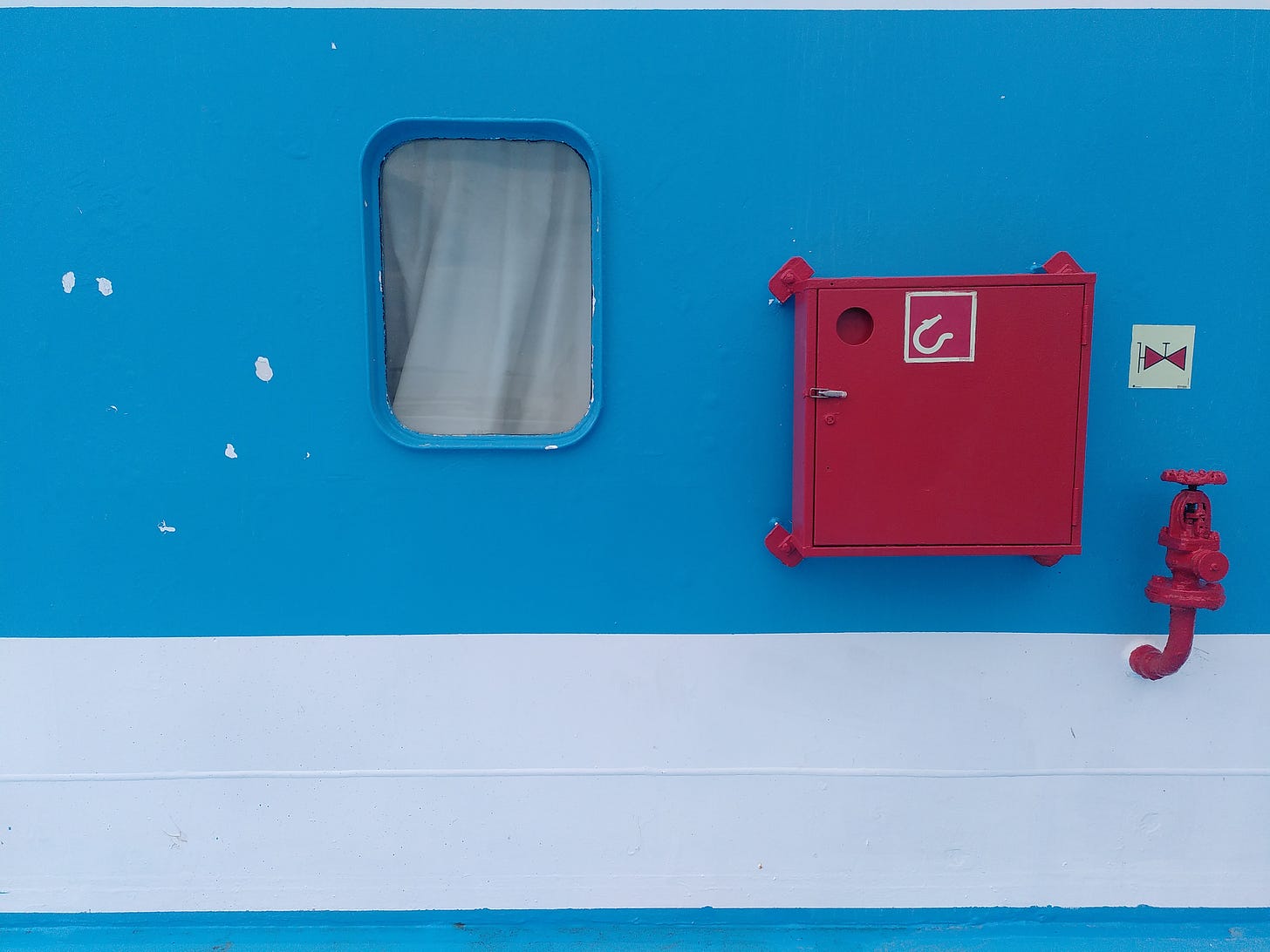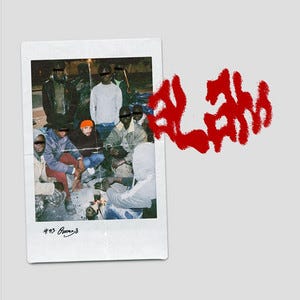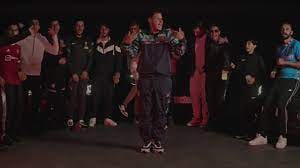"... they'll enjoy their time because there is no need to hurry."
Deep travels, border controls and Moroccan rhythms
Hi friends,
How are you doing? Today, I’m writing from Fes, where I’ll be residing for the next 7 weeks or so. (Dites-moi si vous souhaitez que je traduise cette lettre en français !)
A week ago, I set out onto "the big one": I took my grounded adventures beyond the European continent, for the very first time. There are several grounded routes that could have taken me from Berlin, my home base, to Morocco. They all include ferries crossing the Mediterranean sea, from destinations such as Genova, Sete, Marseille, Barcelona, Motril or Algeciras. Taking the latter would imply training towards the South of Spain, which I have previously experimented with. The "cheapest" option, this time, took me on a 5 day adventure via Marseille.
Day 1: Berlin-Marseille can be done in a day and just two trains. Maybe my experience with grounded travel is starting to seriously alter my perception of time OR Monica Byrne is a genius writer. Either way–or probably both simultaneously–these 12h passed in a glimpse. The Actual Star is the one!
After a few hours of work, I spent a huge chunk of my time absorbed in this wondrous novel which weaves three different tales set in 1012, 2012 and 3012. In the future, most humans live by "Laviaja, a global system of nomadic, subsidiarist, anarchic self-organization in 3012, formalized by climate refugees in the late twenty-third century". It is "characterized by mutual aid, gift economy, panoptic justice, gender concórdia, documented anarchy, and algorithmic skillmatching." Laviaja is associated with the legend of Saint Leah, a young American Mopan Maya who, when she visits Belize in 2012, describes a future where "no one will hurt each other anymore. Everyone will walk everywhere, looking for where they belong, like how I feel I belong here. But they'll enjoy their time because there is no need to hurry. There will be great festivals, like masquerade balls, except with millions of people at once, all being exactly who they want to be." She's quick to differentiate it from utopia, though: "There's no end to desire. [...] And it's only going to get worse as entropy grows. [...] As the universe comes apart, everything will get farther and farther away. So we'll have to work harder to get it."
Other abstracts of the sci-fi novel particularly resonated with my recent reflections on the different mobility models that occurred throughout humanity's history. A chapter set in 3012 sees two characters describing the "relations with the sedentix, the few thousand humans who opted to settle in one place" instead of wandering. They debate about which state of life (sedentary vs. nomadic) was “natural” for humans and when.
Day 2: I woke up in Marseille, showed up early at the port … and still thought I might miss boarding. If you're tempted by this journey, be warned: there are very few walking passengers travelling this way, so our check-in procedure is somewhat hazardous! Mostly car drivers, mostly male-presenting passengers and I was one of the rare white persons on board. I settled in the seat which was also supposed to be my bed for the next two nights. No cabin, as I had booked my trip late-ish and needed to limit the costs. But what apparently lacked comfort, exceeded in hospitality. The other passengers provided me with thick blankets to sleep on the floor and constantly offered me food or checked in on me.
I was very tempted to spend the next 44h or so continuing to "get on top of work". As the French coast faded on the horizon and I lost signal, I thought once again of Leah's dream of a future where we will enjoy our time "because there is no need to hurry". Our relationship to time, labour and productivity is a regular topic of conversation with my loved ones. My partner even named his recent and–dare I say it–excellent release "Workahol". With these fast rhythms in mind, I wondered how I could truly honor my future-shaping journey.
I wish more of us had access to these slow travels: not only in terms of time, costs and infrastructure (although frankly that's already a lot) but also in terms of borders. In possession of Belgian and French passports, I didn't even have to ask for a visa to enter Morocco. A Moroccan passport guarantees visa-free travel to 64 countries. To enter Europe, a Schengen visa is required for a maximum of 90 days. French passport holders enjoy visa-free access to 189 destinations worldwide.
Organizers of the Moroccan festival Atlas Electronic wrote that: "traveling beyond your physical and mental territories is, for many, still a luxury. [...] While we find comfort in the idea of living in a so-called free world, a quick comparison of passports harshly shows us that truly free are those who own one of a First-World country. And that those born in the Third-World, are inclined to remain there."
The Strait of Gibraltar is the entrance to Northern Africa for me. To others it is the end of their journey. The two Spanish enclaves on Morocco's Northern coast, Ceuta and Melilla, are regularly the theater of violent oppression. On 24 June 2022, dozens of people were killed at Barrio Chino, the border crossing near Melilla. The number of people who died is unclear, though Ben Ehrenreich wrote that "77 people, most of them young men who had fled their homes in Sudan and South Sudan, are still missing." In his article for the LRB, the journalist added that "as the fences around Melilla and Ceuta have been reinforced and the Mediterranean militarised, an increasing number of migrants have sought to reach the Canary islands, also a Spanish possession, in small boats from the African mainland, despite the dangers of the ocean crossing. It's a far more perilous journey than the deadly routes across the Mediterranean. In the five years between 2018 and 2022, according to a recent report by Caminando Fronteras, 11,286 died trying to enter Spanish territory, almost all of them at sea."
Grounded travel is not a romantic option for those who don't hold the same passport privilege as I do. But maybe it also allowed me to bear witness, albeit in a very distant way, to a cruel irony: the countries who are most responsible for the climate crisis are keeping their borders shut to those who suffer its consequences the most.
On May, 19th, singer Ouenza, who lives between Paris and Casablanca, released his new mixtape, ALAM, reflecting on immigration and the challenges faced by asylum seekers. (Meghboune is my fave.)
Day 3: Still on the ferry!! In between a bit of work and a lot of Rekordbox, I started reading Faith Adiele's memoir, Meeting Faith, The Forest Journals of a Black Buddhist Nun. The Nigerian-Nordic American writer works on "decolonizing travel" and will be at Nawat Fes in the same residency period as me. After a first visit to Thailand in 1979, Faith traveled back a few years later with a research project on maechi, the female Buddist monastics in Thailand.
Her book tells the story of her almost accidental ordination. It is an incredibly generous account of deep travel, combining humor and spiritual insights with a wealth of reflections on gender, race, class, bodies, etc. Reading it helped me, yet again, to decenter my own experiences of spatial mobility.
It suggested, too, that flights may be multiple, multi-directional. In Faith’s words: “I fled the West precisely because of [...] dichotomous thinking, the crushing pressure to either-or, to exist in black or white. This pressure has led me, like any respectable American girl, to hate my body a bit. It is, after all, the site of a tiresome external identity: the blackness that will get you tossed before a subway train, the femaleness that will get you felt up or held down. The biracialness, a lack of clarity, which never fails to unsettle. The East, famously, romantically, tolerant of ambivalence, or a both-and world, is supposed to be my salvation.”
Day 4: I was awake before the sun started rising in quick pink dances behind a calm sea. The south Spanish coast appeared timidly, intertwined between tight clouds and the water. After a while, sitting alone on the side of our boat, I saw the first dolphins popping out. I was all at once euphoric and worried that ferries might be dangerous for them. As other passengers woke up, more and more joined in the cute fish spotting activity, fingers pointing in three different directions every other minute. Someone bragged about having once seen a whale splashing its tail when the ferry was passing by Ibiza. Of course, the fish is always bigger on the other side !
We spent hours on the deck, as I was listening to dolphin facts, Moroccan tips and travel stories. One highlight was that "everyone is welcome in Morocco", except luxurious camper vans or off-puttingly expensive cars: "Don't show off with a vehicle that's worth more money than everything a village owns... or don't complain that it gets stones thrown at it!"
I was getting familiar with some passengers, even the awkward yet polite ones who'd been loudly snoring on the same hard floor I had slept on. Some even offered free rides to the city center, an hour's drive away. We would part and I might miss them, the way I was already missing Leah and the other Actual Star characters. Even slow travels and long books can feel too short.
Upon arrival at the port, I wrestled with a few taxi drivers. Finding the bus stop proved to be even more difficult: clearly this mode of transport wasn't much of an option for tourists. My insistence on traveling by public transport partly stems from a stubborn political belief in them and, in this case, a pragmatic need to keep the costs low. I paid 8MAD (70 cents euro), whereas a taxi journey would have cost at least 10 times more. Yet, again, the commitment paid off in other ways: the bus drive was an immediate invitation to surrender to a different kind of temporality. No timetables, nor official stops. After an indefinite wait, I was taken on board a busy and bumpy ride with passengers vigorously hitting the back door to signal when they needed to be dropped. We'd stop at an odd corner, near a grazing donkey, before carrying on along the coast.
Later that night, I was bouncing to the sounds of MA3IZ echoing in the tortuous streets of Tanger's medina before sharing a bed with a cute kitten named... Booraq ("TGV")? We were bound to be a good match!
Day 5: After an early morning swim in the sea, I visited a museum dedicated to Ibn Battûta. Born in 1304 in Tangier, the scholar and explorer is a historical figure and local pride. From boats to the airport, the pilgrims lent his name to so much local travel infrastructure. It was my host who’d made sure I checked the museum: “He is so important! He was the first to travel this far and this way!” Why had I never heard of him?
In between south-up facing maps, the museum deploys Ibn Battûta’s life-long trajectory. Starting off with a 6-month pilgrimage to Mecca in 1325, he is said to have traveled 120 000km over decades. On a corner of a wall, we are reminded that travel wasn’t easy a millennium ago. Most people walked and were only occasionally helped by mules, horses, donkeys or camels. Sedan chairs and chariots were reserved for “the older and the very rich”.
My journey led me where Ibn Battûta had stopped his. The scholar died in Fes where he completed his travelog, The Rihla, “A Masterpiece to Those Who Contemplate the Wonders of Cities and the Marvels of Travelling”. A direct train took me from Tangier to Fes. 4h30 has never felt this fast.
Nawat Fes, the artist residency program of the American Language Center Fes / Arabic Language Institute in Fez (ALC-Fes/ALIF) invited me for a 2-month residency. I am immensely grateful for their support of my commitment and interest in my work. Arriving at my destination, I looked over the medina in wild amazement and, in a silent prayer, thanked all those who helped me on the way. Looking now to what lay ahead, I borrowed, one last time, the words of The Actual Star: “God of this place: do you know me?”
Xx
Nono
PS: many thanks to Lori and Tash for helping out with this essay!
Broadcasting
In The Actual Star, fiction is described as “the science of learning the universe by creating it”! <3
After wondering if there are any myths, past or future, that could support a collective walk towards a fairer world. I wanted to explore sounds and music related to protests, processions and groups of people all moving in the same direction. This is the result, mixing René Daumal’s Mount Analogue, a work by The Institute of Queer Ecology and 90 minutes of music.
Researching
If you have any Moroccan tips (places, contacts, books, music, etc.), I’d love to receive them <3
I started working on a newsletter edition exploring the environmental impact of our digital lives and how that’s relevant to our culture and communities. Any recommendations of things to read or listen to? STOMP (which I’m not part of) launched a survey for musicians and their digital practices: you can fill it here!
Campaigning
I started working for Stay Grounded, coordinating their German-speaking multipliers network. If you’d like to book a workshop about aviation and climate justice, hit us up.
We’re also hosting a webinar in French, German and English in June. Did you know that...
only 1% of the world population is responsible for 50% of climate-heating aviation emissions?
the carbon footprint of one return flight from New York to London is nearly the double of the yearly total average footprint of a person living in India?
in order to reach climate goals and achieve a just transition of the aviation sector, technological “fixes” won’t do the trick?
If you want to know more, please sign up here before June 4th.
Gigging
I’d love to find more opportunities to travel intentionally from, in between and to places. If you can think of any (grounded or mixing) workshops, DJ set opportunities or any other collaborations en route to the following gigs, I would be grateful for your help. I’m especially hoping to travel through Portugal and Spain on the way back from Morocco or later this year.
29.07: TBA (France)
05.08: TORNOAD RIDDIM microfestival near St Brieuc (France)
09.09: CHANTELOUVE microfestival near Grenoble (France) As I mentioned in a former newsletter, this was a highlight last year! However, it’s already sold out.
16.09: TBA (Italy)
21.10: Fictions Party at Sameheads (Berlin)
November: Minor Science and I will be spending some time in the UK :)






